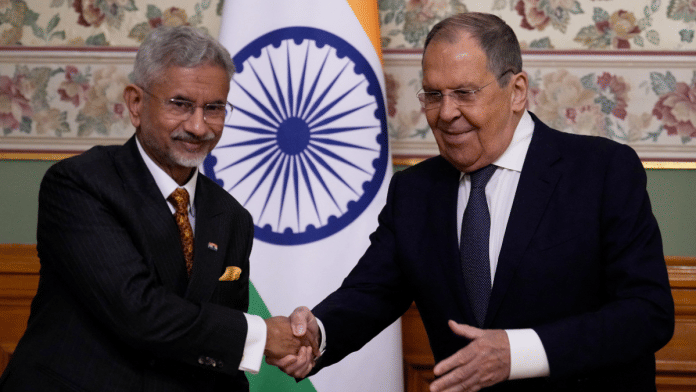New Delhi: India’s External Affairs Minister S. Jaishankar hit back at US’ claims that New Delhi has been profiteering from the Russia-Ukraine war, describing that he is “perplexed” by the claims made by Washington D.C.
“We are not the biggest purchasers of Russian oil, that is China. We are not the biggest purchasers of Russian LNG. I’m not sure but I think that is the European Union. We are not the country which has the biggest trade surge with Russia after 2022. I think there are some countries to the south,” Jaishankar said at a joint press briefing with his Russian counterpart Sergey Lavrov in Moscow Thursday.
A raft of American officials have come out in recent days accusing India of war profiteering including Treasury Secretary Scott Bessent and White House Counsellor for trade and manufacturing Peter Navarro, who recently wrote an opinion piece in the Financial Times on the subject.
The Indian External Affairs Minister added: “We are a country where Americans actually said for the last few years that we should do everything to stabilise the world energy markets including buying oil from Russia. Incidentally, we also buy oil from America. And that amount has been increasing. So quite honestly, we are very perplexed at the logic of the argument that you had referred to.”
The US administration led by President Donald J. Trump has in recent weeks criticised India for its continued purchase of Russian oil. Trump imposed a “penalty” of 25 per cent levies on Indian exports to American markets on 6 August, due to New Delhi’s continued support for the Russian war-machine. This raises total tariffs on India to 50 per cent, which is one of the highest amongst all of the US’ trade partners.
Jaishankar is in Moscow for a three-day visit, where he co-chaired the India – Russia Inter-Governmental Commission on Trade, Economic, Scientific, Technological and Cultural Cooperation (IRIGC-TEC), along with holding a bilateral discussion with Lavrov as well as meeting with Denis Manturov, the first Deputy Prime Minister of Russia.
India has consistently rejected the US’ claim, with the Ministry of External Affairs calling the assertions emanating from Washington DC as “unjustified and unreasonable.” The 5 August statement by Randhir Jaiswal, the official spokesperson for the MEA pointed out that the European Union (EU) had roughly $67.5 billion worth of trade with Russia last year, while the US imports uranium hexafluoride for its nuclear industry and palladium for electronic vehicles (EVs) from Moscow.
India and the Eurasian Economic Union (EAEU) agreed to terms of reference for a free trade agreement, with negotiations set to begin soon during Jaishankar’s visit to Moscow.
Strained India-US ties, New Delhi looks to Russia & China
Ties between India and the US have hit a rough patch in recent months over the stalled negotiations for a bilateral trade deal. The Trump administration has been seeking larger access to India’s agricultural and dairy markets, which are red lines for New Delhi. India, however, was willing to make concessions with certain agricultural products and processed dairy. This was not enough to clinch the deal.
The Trump administration has further claimed that its imposition of a 50 per cent tariff on India led to Russian President Vladimir Putin agreeing to meet the American President on 15 August in Alaska. However, India has maintained that it will continue to purchase oil from global markets as per its energy needs.
Russia has grown to become India’s largest supplier of crude oil since the outbreak of war with Ukraine in 2022. In the last financial year, India imported roughly $56 billion of crude from Russia. The US has been pushing India to purchase more crude from its companies. India imported roughly $14 billion worth of petroleum products from the US in the last financial year (2024-2025), which is 10 per cent higher than a year earlier.
In recent weeks India has moved to strengthen its ties with Russia, while also working to reduce tensions with China. Chinese Foreign Minister Wang Yi was in New Delhi for three days earlier this week for the Special Representative talks with National Security Adviser Ajit Doval.
India and China agreed to a “mutually acceptable” settlement to the boundary question based on the 2005 Agreement on Political Parameters for Settlement of the India – China Boundary Question. This marks a shift in New Delhi’s position, as it has maintained that without peace at the border, talks on the larger areas of ties cannot occur.
However, the 2005 agreement bifurcates the boundary question from the larger political and economic relationship. By making the shift, India is focusing on strengthening its other partnerships as ties remain strained with the US.
(Edited by Vidhi Bhutra)
Also read: Russia hopes to revive RIC, criticises US threat of sanctions against India






